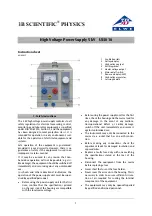
3B SCIENTIFIC
®
PHYSICS
1
High Voltage Power Supply 5 kV U33010
Instruction sheet
02/08 ALF
1 Ventilation
slots
2 Voltage
display
3 High voltage output
4 Earthing
socket
5 Heater voltage output
6 Mains on/off switch
7 Power on display (LED)
8 High voltage regulator
9 Carrying
handle
1. Safety instructions
The 5 kV high voltage power supply conforms to all
safety regulations for electrical measuring, control,
monitoring and laboratory equipment, as specified
under DIN EN 61010, Section 1, and the equipment
has been designed to meet protection class I. It is
intended for operation in a dry environment, suit-
able for the operation of electrical equipment and
systems.
Safe operation of the equipment is guaranteed,
provided it is used correctly. However, there is no
guarantee of safety if the equipment is used in an
improper or careless manner.
If it may be assumed for any reason that non-
hazardous operation will not be possible (e.g. visi-
ble damage), the equipment should be switched off
immediately and secured against any unintended
use.
In schools and other educational institutions, the
operation of the power supply unit must be super-
vised by qualified personnel.
•
Before using the power supply unit for the first
time, confirm that the specifications printed
on the rear side of the housing are compatible
with the local mains voltage.
•
Before using the power supply unit for the first
time, check the housing and the mains lead for
any damage. In the event of any malfunc-
tion/operational defect or visible damage,
switch off the unit immediately and secure it
against unintended use.
•
The instrument may only be connected to the
mains via a socket that has an earth connec-
tion.
•
Before making any connections, check the
experiment leads for damaged insulation and
exposed wires.
•
Replace a faulty fuse only with one matching
the specifications stated at the rear of the
housing.
•
Disconnect the equipment from the mains
before replacing a fuse.
•
Never short the fuse or the fuse holder.
•
Never cover the air vents in the housing. This is
necessary in order to ensure sufficient circula-
tion of air required for cooling the internal
components of the equipment.
•
The equipment may only be opened/repaired
by qualified and trained personnel.


